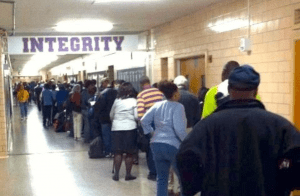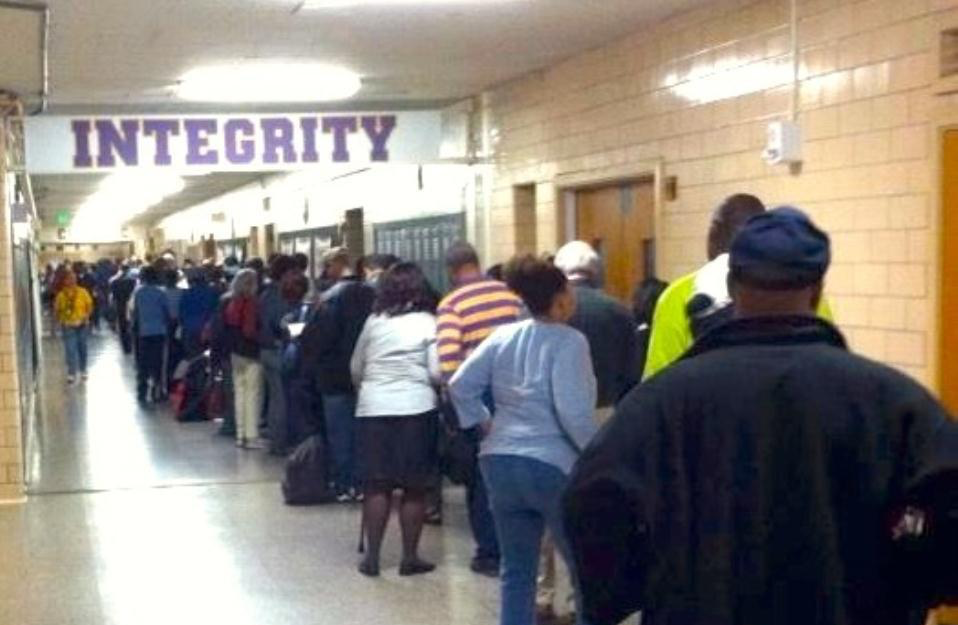 With the primary behind us… Well, not exactly. The Maryland State Board of Elections has still not published data for provisional votes or the second round of absentee ballots. Presumably it will before the winners are formally certified on Friday. But okay, with the primary almost behind us and the general election just six months ahead, we can’t be the only ones thinking that our election process could stand improvement.
With the primary behind us… Well, not exactly. The Maryland State Board of Elections has still not published data for provisional votes or the second round of absentee ballots. Presumably it will before the winners are formally certified on Friday. But okay, with the primary almost behind us and the general election just six months ahead, we can’t be the only ones thinking that our election process could stand improvement.
Accordingly, we’re asking for your advice as to what changes need to be made and for which we might lobby.
To get this conversation started, here, in no particular order, are a few adjustments we’re already considering. We’ll number them so that you can comment about them specifically.
1. Make the $6000 personal/corporate contribution limit apply to the candidate him or herself.
This change will discourage people from running for office for no other reason but that they can personally afford it. It will also prevent the extremely wealthy from using their resources to overwhelm campaigns which may have widespread support, but not the resources to make comparable investments for media and campaign organization.
Would Donald Trump be running if he wasn’t rich? More locally, David Warnock?
2. Require that prospective candidates demonstrate – presumably by petition – some minimum level of interest in their candidacy prior to their filing.
Did we really need 13 people running for Mayor of Baltimore?
3. Put an end to election by plurality.
Let’s restore majority rule. Democratic Nominee for Mayor Catherine Pugh won with only 37% of the vote. Round numbers, that’s only 37% of the 43% of Democratic registered voters in Baltimore who cared enough to show up. In effect, Ms. Pugh won with the support of only 16% of registered Democratic voters.
Sheila Dixon was behind Ms. Pugh with 33% of the vote. Aren’t any of you the least bit curious who would have won and by how much if there had been a runoff? Or if people would have been allowed to indicate their first and second choices?
4. Reconsider early voting.
Okay. We get it. People would like to avoid long lines on Election Day and turnout is probably higher with early because some people can’t make it to the polls between 7 AM and 8 PM if only a single day is set aside for voting.
But wait a minute. What does early voting do for us that absente ballots haven’t already done for years? Is early voting really any easier – not to mention less expensive for the state – than filling out an absentee ballot basically whenever it’s convenient for you? The fact is, we don’t really trust absentee ballots, do we? They could be lost in the mail or filled out by someone other than the voter. It’s okay to let a relatively few people vote by mail, but only so long as it’s not a significant percentage of total votes cast. (So much for the notion that, in a close election, every vote counts.)
Okay, so we’ve allocated a week for early voting to make it easier for voters to get to the polls. But why is there a break between the end of early voting and Election Day? Probably to allow the Board of Election to close the special early voting precincts and get the Election Day precincts open. Solution: Let’s replace the zillions of Election Day precincts with a much smaller number of larger voting locations and keep them open for a full week of contiguous days, Sunday included. “Election Day” now becomes “Election Week.”
5. Institute online voting.
The technology exists for secure, 24 x 7 online voting. What could be more convenient? It’s an essential modernization of the voting process that’s long overdue.
So, there you go. Now, what do you think? You can leave us a comment or, if you prefer privacy, send us an email to Info@BaltimoreRising.org. Thanks for sharing your ideas with us.

